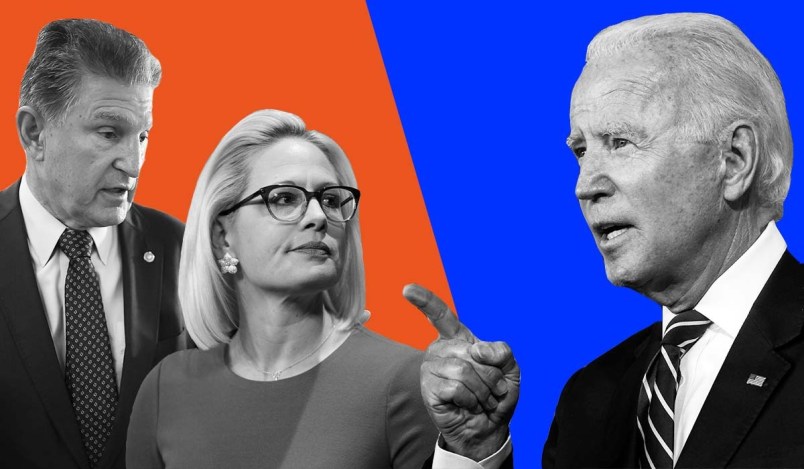We are now down to the crunch time on the Biden agenda. And we don’t know how it will turn out. But there are two aspects of the story which have been quite damaging for the Democrats. They’re worth discussing.
The first is one we’ve discussed before but in a different context. It’s largely a press failure. But it’s one Democrats could do more to fix. For months we’ve had this intra-party debate presented as one between “progressives” and “moderates.” Often that gets personalized as AOC and Bernie versus Joe Manchin or Kyrsten Sinema. This is demonstrably false. The overall package is supported overwhelmingly by Democrats in both chambers and pretty much across all factions. There are some quibbles about SALT taxes and the scope of the climate package. Some more middle-of-the-road Dems resist making some of the social programs permanent. Those are real and potentially consequential differences. But they’re all negotiable. The important point is that this package is the consensus position, supported by virtually everyone. It is after all the President’s agenda. Literally. And, as much as these labels confound more than they clarify, President Biden isn’t from AOC’s wing of the party.
The reality is that this package is the consensus position supported overwhelmingly, close to universally, among congressional Democrats with the exception of two senators and maybe a dozen members in the House.
It’s more than just inaccurate. It’s highly damaging for Democrats in general. If this is an argument between the party’s left wing and “moderates,” lots of people are going to think that’s a disagreement where you want to at least split the difference. After all AOC and Bernie are democratic socialists and Fox News is clear that they’re totally scary people. That’s not a dig at either one. It’s just obvious that if you want to sell this agenda you want to sell it as Joe Biden’s agenda rather than AOC’s agenda. And that’s convenient because it is Joe Biden’s agenda!
Put it another way, if the Democratic party is having an argument about whether it’s agenda is too extreme or too expensive, well … that’s a good way to signal, at least to a lot of people, that it is probably is too extreme or too expensive. You’ve got Republicans and Fox News and even Politico and Axios to make that argument. You don’t need Democrats validating it.
This is why the misleading coverage matters. If it’s the entire Democratic party wrestling with two hold-out senators that’s very different. And that actually is what’s happening. Part of the problem is that “progressives” and “moderates” are convenient and understandable shorthands. Even we use them here sometimes, if only because that’s the terminology everyone understands. There’s no good term for “everybody,” which is basically what we’re talking about here. It’s “everybody” versus Manchin and Sinema.
Mostly this is bad press coverage. But bad journalism is like the weather. Whining about it only accomplishes so much – and it’s not much. You need to deal with it. And here Democrats haven’t dealt with it terribly well.
Now to another point. We don’t know what will happen in the midterms. A Republican wave is possible. And having the President’s whole agenda go down in flames is a good way to make that much more likely. Who goes down in a wave election? Not the folks in safe seats. It’s the “moderates,” the folks from the marginal districts. We know this. But this gets us to a paradox about “moderate” positioning.
If the public decides the Democrats’ agenda is too extreme or if the Democrats decide it’s too extreme and the whole agenda blows up the first to the electoral slaughterhouse are the “moderates.” So spending months telling people the agenda is too extreme or too costly or is driving inflation is pretty counterproductive. It’s a really good way to convince people those things are true. And while there are many factors driving the President’s declining popularity, I guarantee you that is a big factor.
Now, obviously politicians need to be able to say what they think and oppose what they think is bad policy or simply things they believe their constituents will oppose. They can’t be in a position where they have to support what they believe is extreme because otherwise voters will also conclude it’s “extreme.” It’s absurd to think that you need to get behind an electorally toxic message like “defund the police” because saying it’s bad policy or bad politics will turn people against it.
Politics is complicated. But there’s a clarifying element in this case. In the current intra-party debate, very few of the qualms from the “moderates” have been based on policy. It’s been about positioning. They wouldn’t concede that point of course. But the details of the debates themselves tell the story. To the great frustration of the White House, the Manchiner mini-faction hasn’t been willing to put out any counter-proposals. Their explanations of what they oppose or why they oppose it changes almost daily. That’s because it’s not about policy. Manchin and Sinema and Gottheimer are trying to get distance from the party’s proposals in order to define themselves as “moderates.” The explanations change because they’re mostly just rhetorical backfill to explain the need to say no to a bunch of stuff. It’s not about particular policies in most cases, it’s a positioning strategy. Indeed, most of the policies are quite popular. It’s about positioning. It’s about saying no to half the stuff, pretty much whatever the stuff is, because that defines you as a “moderate.”
Positioning is okay. That’s part of politics. But as we noted above, the biggest hits for defining the party’s agenda as extreme will be for the moderates and the positioners. It would be different if it were rooted in real ideological differences or perhaps better to say real differences over policy. But in this case mostly it’s not.






